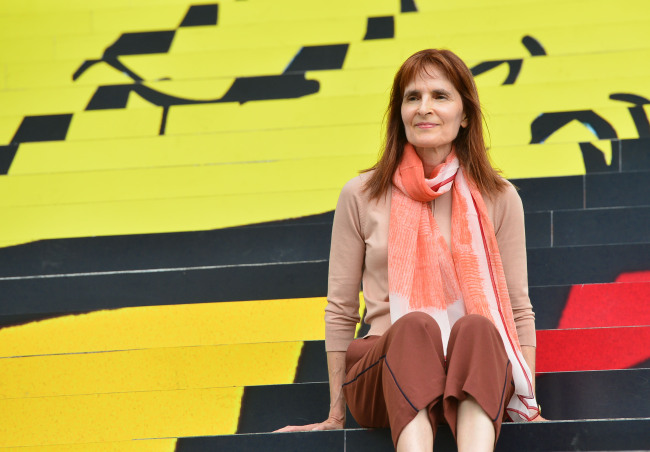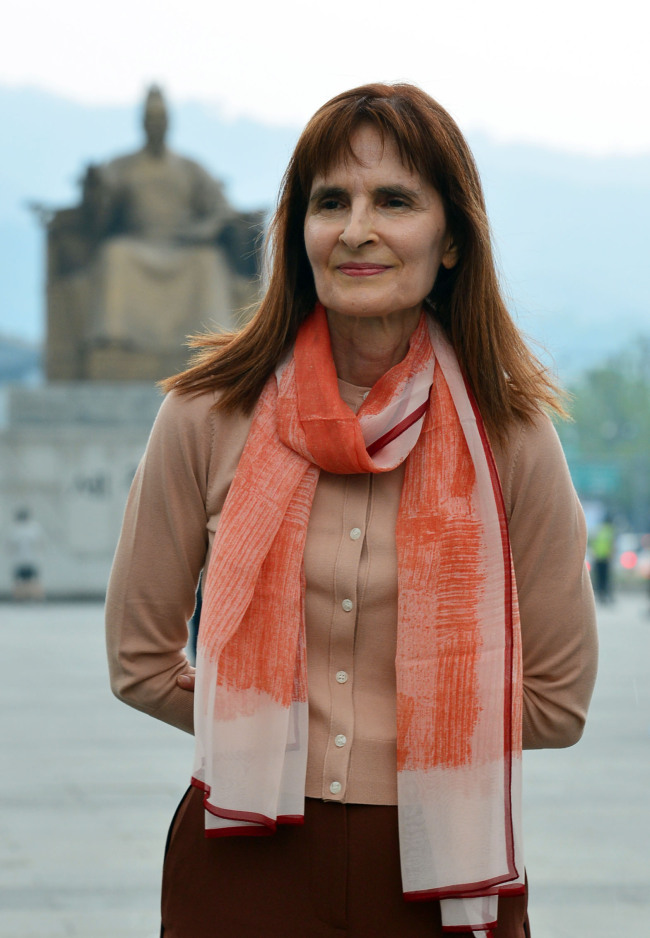[Eye Interview] Canadian scholar says there’s no such thing as ‘perfect’ translation
Theresa Hyun writes poems in Korean and translates them to English, eliminating certain things, creating new meaning along the way
By Julie Kim JacksonPublished : June 10, 2016 - 17:04
For Theresa Hyun -- a Canadian professor of Korean studies and a Korean-language poet -- straddling cultures and translating languages have come to be essential parts of her life.
For her poems, Hyun undertakes a creative process that is doubly atypical: Not only does she both write and translate her own work, she writes her poems in Korean -- the language that she learned latest in life and that is most unfamiliar to her -- and then translates them into English, her mother tongue.
Despite, or perhaps because of her multilingualism -- she also holds a doctorate in French literature -- Hyun does not believe that such a thing as a “perfect” translation -- one where the original and translated texts are exact duplicates of each other and evoke precisely the same feelings -- exists.
For her poems, Hyun undertakes a creative process that is doubly atypical: Not only does she both write and translate her own work, she writes her poems in Korean -- the language that she learned latest in life and that is most unfamiliar to her -- and then translates them into English, her mother tongue.
Despite, or perhaps because of her multilingualism -- she also holds a doctorate in French literature -- Hyun does not believe that such a thing as a “perfect” translation -- one where the original and translated texts are exact duplicates of each other and evoke precisely the same feelings -- exists.

“When you say ‘perfect,’ you’re already assuming certain standards. What does ‘perfect’ mean? If it means to sound as close to the original text as possible, that’s one thing. But if it means to please the target readers, that’s something else,” Hyun said in an interview with The Korea Herald on Monday at a cafe in downtown Seoul.
For Hyun, it is inevitable that certain meanings and emotions become lost, transformed, and added on during the course of translation -- even when the writer and translator are one and the same.
“Context” and “an understanding of the readers” are more important to her than rigidly adhering to literal definitions, she said, which is why she decided to make the English title of her recently published book of bilingual poems “Riding the Peace Express.”
“If you translated (the title) literally from Korean, it would be something like ‘The Train is Running Toward Peace,’” she said.
The term “Peace Express,” on the other hand, is compact, immediately understandable to native English speakers, and recalls other works of literature that have similar titles, she pointed out.
“The English word for ‘translate’ means to carry something from one side to another. In other languages, ‘translate’ means to give birth, to take one shape and make a different shape. So (translation) can be a completely different concept to different people.”

Hyun also believes that the very act of communicating, even in a single language, involves some form of “translation.”
“All language is a kind of translation because we’re always going back and forth between different levels,” she said. “When we’re communicating with others, we’re coming outside of ourselves. We’re translating what we’re thinking on the inside into language, whether we realize that or not.”
Hyun, who teaches Korean studies at York University in Toronto, Canada only started learning Korean in the 1980s when she came to Korea to teach French literature at Kyunghee University.
She first began composing poems in Korean in 1992 while taking writing classes hosted by local poetry magazine “Siwa Sihak,” or “Poetry and Poetics.” In 2003, she won the publication’s New Poet Award and has since been active as a member of the Korean Canadian Writers’ Association.
Initially, poetry was a way for her to “understand and empathize with the Korean people and their situation” as well as a means of “self-discovery.” Now, the Korean identity has come to be very much a part of her own, she said.
“Riding the Peace Express,” her second poetry compilation following 2012’s “A Cup of Tea at P’anmunjom (DMZ),” was published last month. It is comprised of 35 bilingual poems that center on the collective Korean “dream” -- the reunification of the two Koreas.
The book’s first poem features a speaker who yearns to ride a train, the Peace Express, from Korea’s southern port city of Busan to Pyongyang, the North Korean capital, and onward to the Mongol steppe, the Siberian tundra and the Red Square in Moscow.
“The idea is that Korea is connected to the whole world when it’s unified,” said Hyun. “This is a dream, and at the moment it seems like we may never realize it. ... I’m not approaching (reunification) from a social sciences perspective, but trying to empathize with the way people feel. I think one of the poet’s roles is to allow people to have the courage to dream.”
What draws Hyun most to Korea is the everyday life and “energy” of its people, she said, such as depicted in her poem “A Fishwife’s Daily Prayer.”
“My main interest is in the ordinary Korean people, those working in marketplaces and office workers -- just average people. I try to imagine that I’m in their space.”
Other pieces, like “Baskets of Dreams for Sale” imagine locations and situations that Hyun has never before experienced, like a quaint North Korean marketplace.
“Everywhere pineapples, bananas, mangoes overflow / To conquer hunger and sorrow / In their heart’s empty spaces they sprinkle / the seeds of hope,” it reads.
In the book’s foreword, Hyun dedicates her poems to those “who search for their lost homes.”
“I think all human beings, fundamentally, have been chased out of paradise, so to speak. We spend all our lives searching for a lost home, trying to regain some kind of innocence or purity,” said Hyun. “It’s also a very real problem for people who have been displaced throughout the world, which is why I wanted to put the Korean situation in a wider context.”
By Rumy Doo (doo@heraldcorp.com)


















![[Today’s K-pop] Treasure to publish magazine for debut anniversary](http://res.heraldm.com/phpwas/restmb_idxmake.php?idx=642&simg=/content/image/2024/07/26/20240726050551_0.jpg&u=)